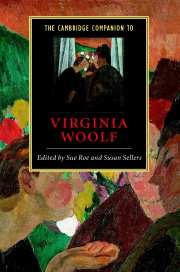Book contents
- Frontmatter
- 1 Bloomsbury
- 2 Finding a voice
- 3 Literary realism in Mrs Dalloway, To the Lighthouse, Orlando and The Waves
- 4 The novels of the 1930s and the impact of history
- 5 Virginia Woolf's essays
- 6 Virginia Woolf's diaries and letters
- 7 Virginia Woolf and the language of authorship
- 8 Virginia Woolf and modernism
- 9 The impact of post-impressionism
- 10 The socio-political vision of the novels
- 11 Woolf's feminism and feminism's Woolf
- 12 Virginia Woolf and psychoanalysis
- Guide to further reading
- Index
9 - The impact of post-impressionism
Published online by Cambridge University Press: 28 May 2006
- Frontmatter
- 1 Bloomsbury
- 2 Finding a voice
- 3 Literary realism in Mrs Dalloway, To the Lighthouse, Orlando and The Waves
- 4 The novels of the 1930s and the impact of history
- 5 Virginia Woolf's essays
- 6 Virginia Woolf's diaries and letters
- 7 Virginia Woolf and the language of authorship
- 8 Virginia Woolf and modernism
- 9 The impact of post-impressionism
- 10 The socio-political vision of the novels
- 11 Woolf's feminism and feminism's Woolf
- 12 Virginia Woolf and psychoanalysis
- Guide to further reading
- Index
Summary
Ethics and art
When the young Virginia Stephen first began to join in discussions with her brother Thoby Stephen's friends who were just down from Cambridge and making new lives in London - people such as Clive Bell, Lytton Strachey, Maynard Keynes - she had already begun to write. She was trying out descriptions of landscape and anecdotal stories designed to show up elements of colour, light, transpositions in language and human character. She described railway journeys and disasters in duckponds; she made up stories about two young ladies going into the society of university educated people and being shocked by the frankness of the discussion: they discovered that one could discuss politics and philosophy in a charged, energetic way; and that talk was designed to discover things and share ideas, rather than being employed simply to perform the acrobatics of polite society (to amuse, while keeping one's own and the listener's actual views and emotions at bay).
There must have been a significant disparity between the materials she was working with to ply the tools of her trade, and the content of the intellectual discussions to which Thoby Stephen introduced her and her sister Vanessa. The feelings of exclusion called up in her by observing the ease with which educated men communicated with one another never left her. Her writing is split, throughout her œuvre, into the kind of writing which makes discoveries through styles of aesthetic charge, and the writings in which she plied her social conscience. In the latter, she usually wrote under strain.
- Type
- Chapter
- Information
- The Cambridge Companion to Virginia Woolf , pp. 164 - 190Publisher: Cambridge University PressPrint publication year: 2000
- 4
- Cited by

